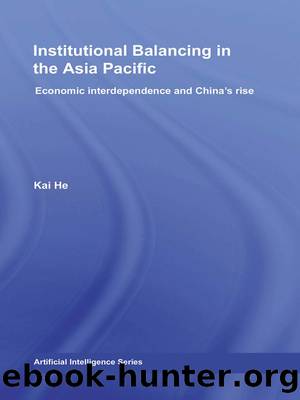Institutional Balancing in the Asia Pacific: Economic Interdependence and China's Rise by Kai He

Author:Kai He [He, Kai]
Language: eng
Format: epub
Tags: International Relations, Globalization, Political Science, General
ISBN: 9780415469524
Google: _PZMxpASjc0C
Goodreads: 6703098
Publisher: Routledge
Published: 2008-11-06T00:00:00+00:00
Japanâs institutional balancing in APT/EAS: reactive diplomacy
While APEC is an economic institution and the ARF focuses on security, Japanâs policy toward APT/EAS is mainly rooted in its political resentments toward the United States and leadership competition with China after the 1997 economic crisis. The Asian financial crisis hit mainly Southeast Asian states, but it also spilled over to affect the banking and financial systems of Japan. The United States was not only lukewarm in wanting to assist the suffering Asian economy, but also blamed Japanâs economic recession as a structural reason for the crisis. Japanâs Asian Monetary Fund proposal was brutally killed by the United States and the IMF. Japan started to realize that what the United States wanted was to share economic burdens with Japan, but not leadership in Asia.
The economic crisis offered an unprecedented opportunity for Chinaâs rise. Chinaâs promise to stabilize its currency was widely praised by both the United States and other regional powers. Chinaâs rise became the major threat to Japanâs leadership goal in regional affairs. Thus, Japan decided to conduct dual institutional balancing strategies through APT/EAS. On the one hand, the exclusion of the United States from APT/EAS helps Japan unite Asian countries to resist U.S. arrogance under Asianized regionalism. On the other hand, Japanâs inclusive institutional balancing counters Chinaâs leadership ambitions within the APT/EAS settings.
Japan previously opposed any exclusive institutional building in Asia which targets the United States. In the early 1990s, Japan did not support Malaysiaâs EAEG and EAEC proposals that promoted exclusive regional trading and economic blocs in East Asia. Since more than one-third of Japanâs exports went to North America and one-fifth to the European Community, it was not in Japanâs economic interests to jeopardize these markets by supporting EAEG or EAEC.66 In addition, Japan did not want to alienate its security protectorâthe United Statesâthrough any exclusive institutional arrangements in the region. That is why Japan always emphasizes the importance of the United States in regional affairs in both APEC and the ARF. Some scholars even doubt whether the Japanese see themselves as closer to the West than to the East. Japanâs East/West identity dilemma may have also contributed to its reluctance toward Asian regionalism in the early 1990s.67
The 1997 economic crisis changed Japanâs attitude toward Asian regionalism. First, Japan realized the deepening economic interdependence among Asian countries as well as the necessity of financial and monetary cooperation in Asia. After the Thai baht collapsed in July 1997, the financial crisis characterized by a currency meltdown rapidly spread to other countries in the region. In 1998, the contagion even affected Russia and Brazil. Japanâs own financial and banking systems were also under great pressures during the economic crisis. The economic crisis revealed the negative face of economic interdependence and globalization, and the financial and monetary vulnerability called for a regional solution. Indeed, the Asian economic crisis offered Japan an unprecedented opportunity to resume leadership in Asia. Soon after the Thai baht crisis, an editorial in Sanei Shimbun, a leading Japanese
Download
This site does not store any files on its server. We only index and link to content provided by other sites. Please contact the content providers to delete copyright contents if any and email us, we'll remove relevant links or contents immediately.
| Anthropology | Archaeology |
| Philosophy | Politics & Government |
| Social Sciences | Sociology |
| Women's Studies |
Born to Run: by Christopher McDougall(6913)
The Leavers by Lisa Ko(6817)
iGen by Jean M. Twenge(5187)
Sapiens by Yuval Noah Harari(5137)
The Kite Runner by Khaled Hosseini(4975)
Spare by Prince Harry The Duke of Sussex(4817)
Bullshit Jobs by David Graeber(3860)
Machine Learning at Scale with H2O by Gregory Keys | David Whiting(3695)
Never by Ken Follett(3562)
Livewired by David Eagleman(3547)
Goodbye Paradise(3473)
Fairy Tale by Stephen King(2995)
A Dictionary of Sociology by Unknown(2869)
Harry Potter 4 - Harry Potter and The Goblet of Fire by J.K.Rowling(2831)
The Social Psychology of Inequality by Unknown(2782)
The Club by A.L. Brooks(2763)
0041152001443424520 .pdf by Unknown(2638)
People of the Earth: An Introduction to World Prehistory by Dr. Brian Fagan & Nadia Durrani(2633)
Will by Will Smith(2610)
